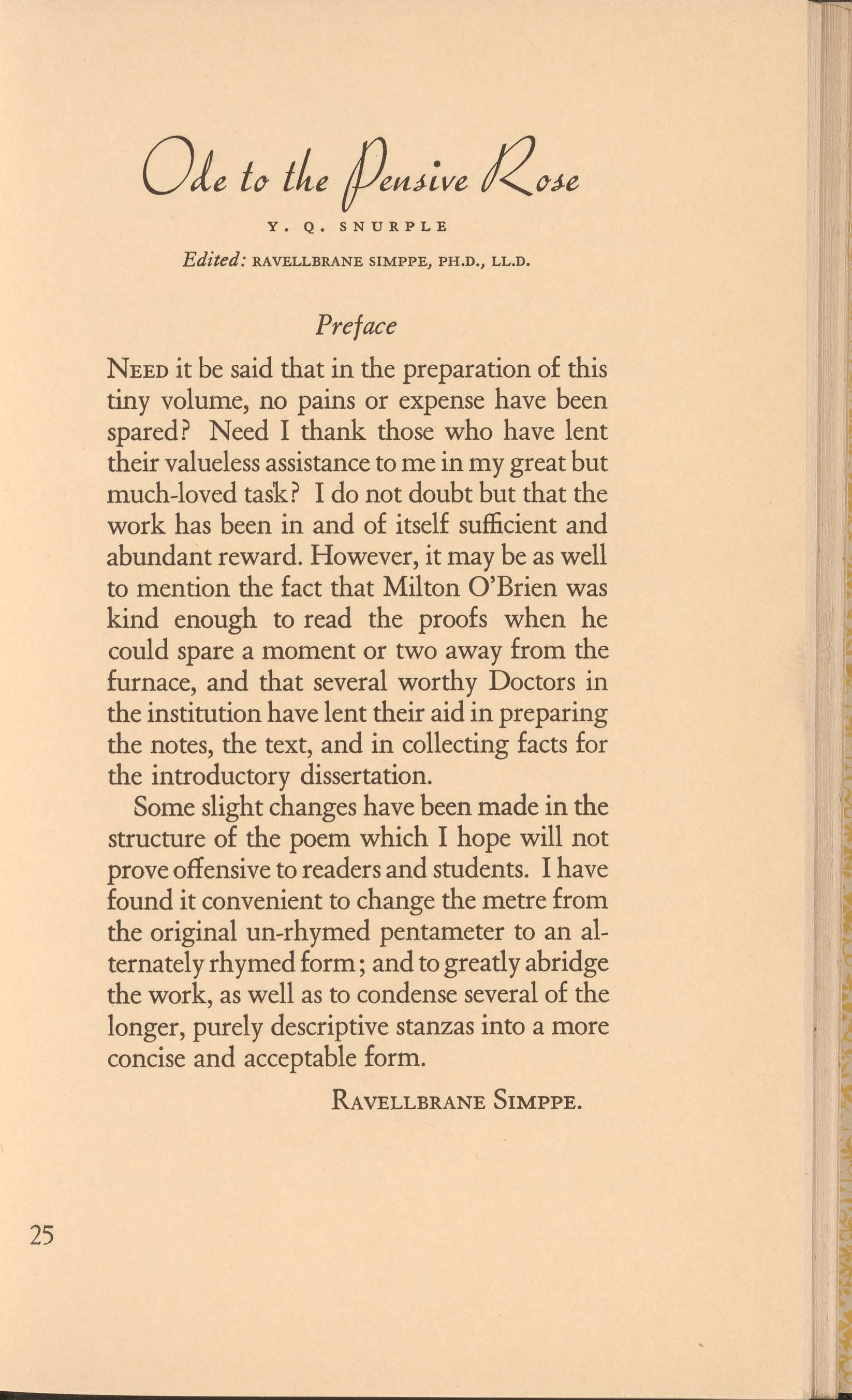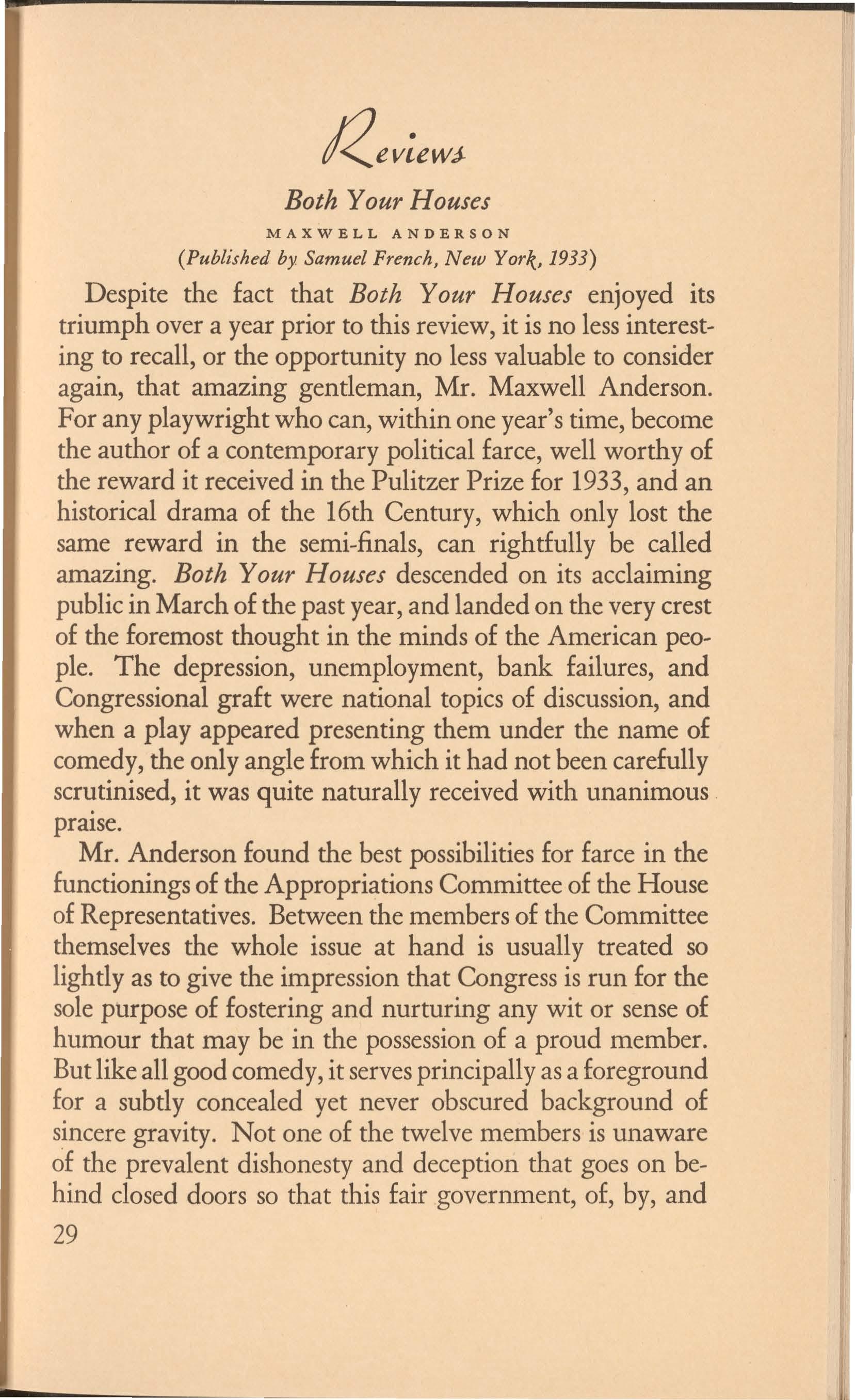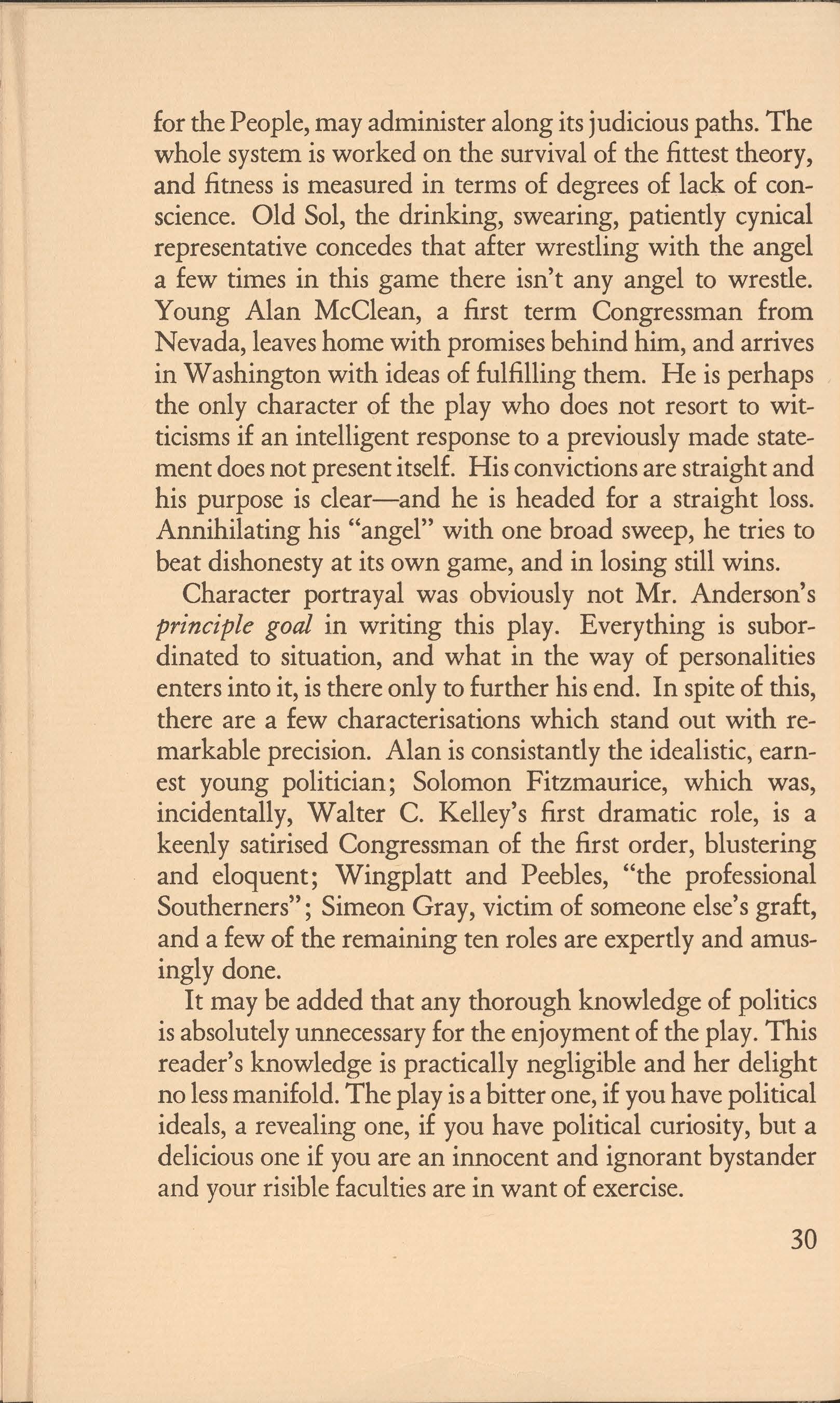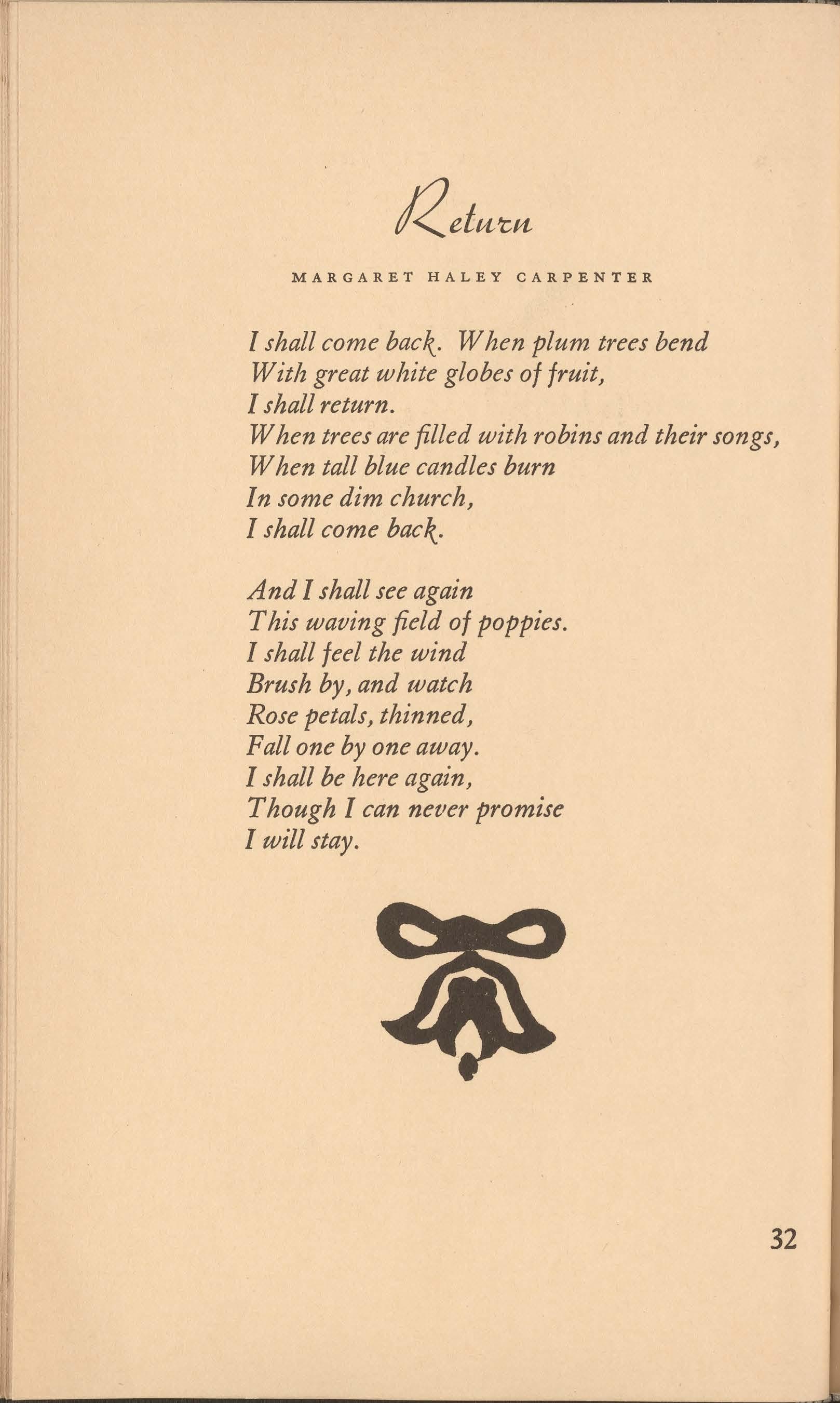SuE CooK McCLURE, Editor-In-Chief; LOUISE CowHERD, Associate Editor; MARGARET WATKINS, Business Manager; BEVERLEY BATES, Art Editor; EsTHER WALSH, Exchange Editor; PAGE JoHNSTON, Assistant Editor.
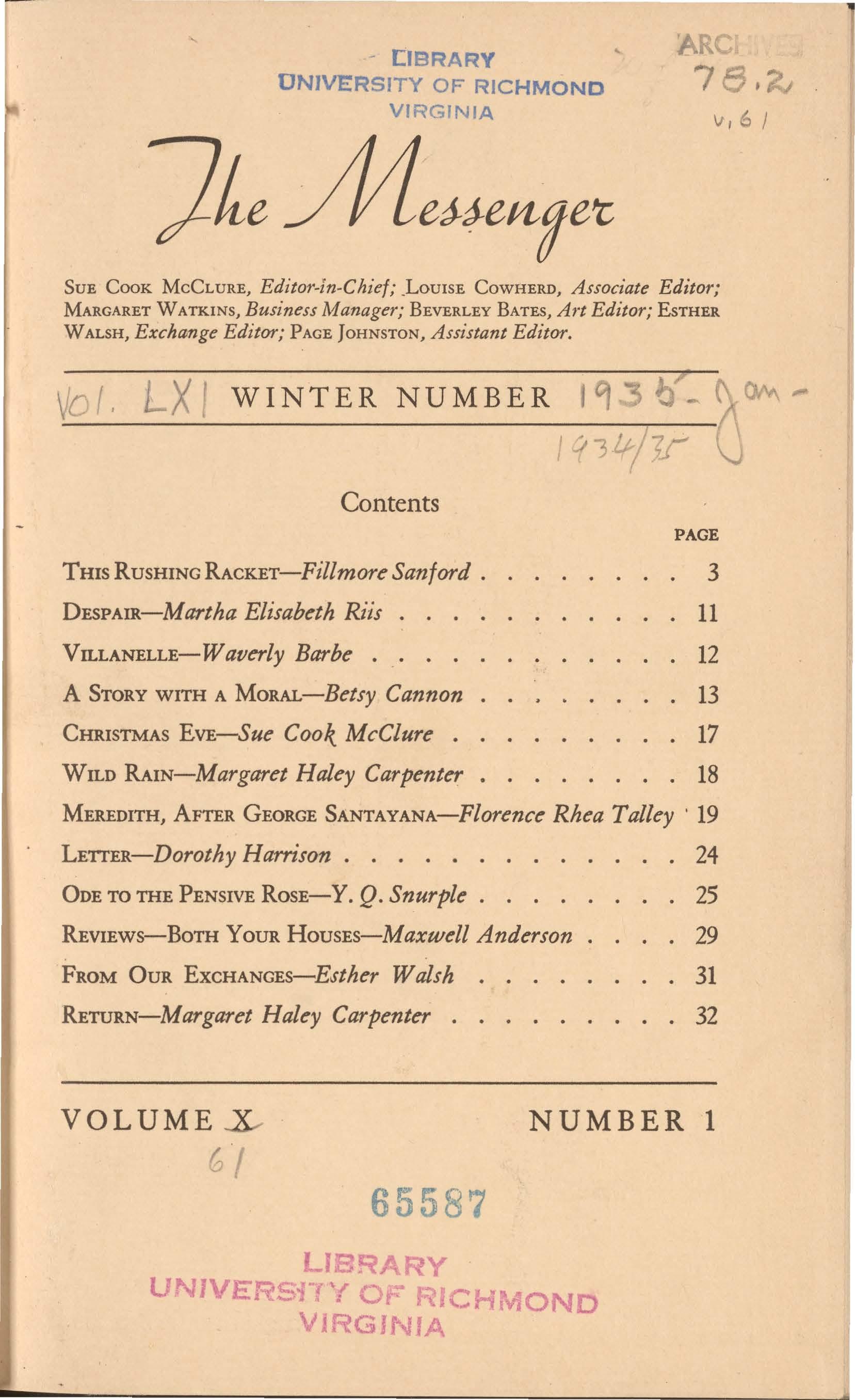
Tms RusHING RACKET-Fillmore Sanford .
Elisabeth Riis

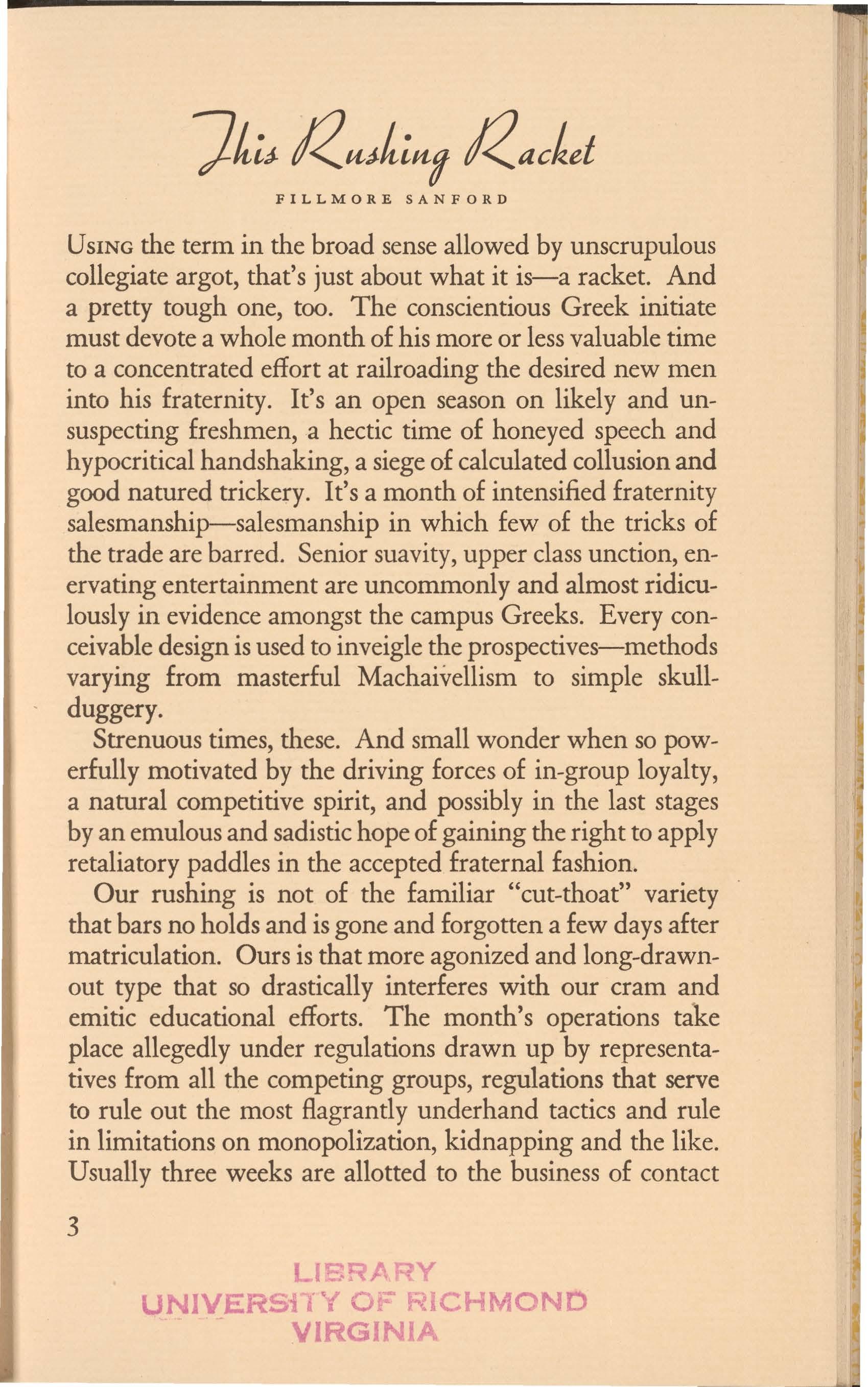
FILLMORE SANFORD
UsINGthe term in the broad sense allowed by unscrupulous collegiate argot, that's just about what it is-a racket. And a pretty tough one, too. The conscientious Greek initiate must devote a whole month of his more or less valuable time to a concentrated effort at railroading the desired new men into his fraternity. It's an open season on likely and unsuspecting freshmen, a hectic time of honeyed speech and hypocritical handshaking, a siege of calculated collusion and good natured trickery. It's a month of intensified fraternity salesmanship-salesmanship in which few of the tricks of the trade are barred. Senior suavity, upper class unction, enervating entertainment are uncommonly and almost ridiculously in evidence amongst the campus Greeks. Every conceivable design is used to inveigle the prospectives-methods varying from masterful Machaivellism to simple skullduggery.
Strenuous times, these. And small wonder when so powerfully motivated by the driving forces of in-group loyalty, a natural competitive spirit, and possibly in the last stages by an emulous and sadistic hope of gaining the right to apply retaliatory paddles in the accepted fraternal fashion.
Our rushing is not of the familiar "cut-thoat" variety that bars no holds and is gone and forgotten a few days after matriculation. Ours is that more agonized and long-drawnout type that so drastically interferes with our cram and emitic educational efforts. The month's operations take place allegedly under regulations drawn up by representatives from all the competing groups, regulations that serve to rule out the most flagrantly underhand tactics and rule in limitations on monopolization, kidnapping and the like. Usually three weeks are allotted to the business of contact
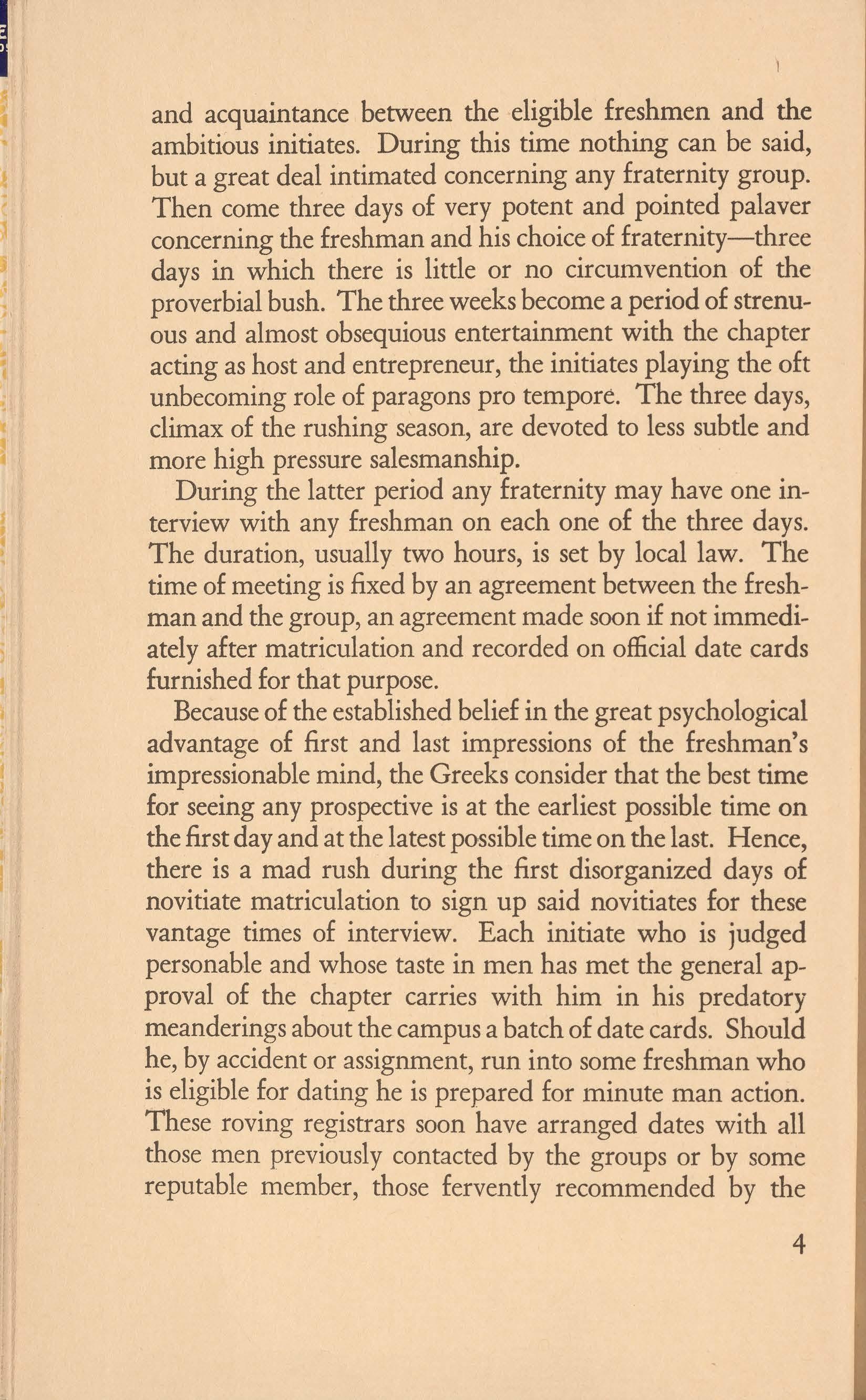
Iand acquaintance between the eligible freshmen and the ambitious initiates. During this time nothing can be said, but a great deal intimated concerning any fraternity group. Then come three days of very potent and pointed palaver concerning the freshman and his choice of fraternity-three days in which there is little or no circumvention of the proverbial bush. The three weeks become a period of strenuous and almost obsequious entertainment with the chapter acting as host and entrepreneur, the initiates playing the oft unbecoming role of paragons pro tempore. The three days, climax of the rushing season, are devoted to less subtle and more high pressure salesmanship.
During the latter period any fraternity may have one interview with any freshman on each one of the three days. The duration, usually two hours, is set by local law. The time of meeting is fixed by an agreement between the freshman and the group, an agreement made soon if not immediately after matriculation and recorded on official date cards furnished for that purpose.
Becauseof the established belief in the great psychological advantage of first and last impressions of the freshman's impressionable mind, the Greeks consider that the best time for seeing any prospective is at the earliest possible time on the first day and at the latest possible time on the last. Hence, there is a mad rush during the first disorganized days of novitiate matriculation to sign up said novitiates for these vantage times of interview. Each initiate who is judged personable and whose taste in men has met the general approval of the chapter carries with him in his predatory meanderings about the campus a batch of date cards. Should he, by accident or assignment, run into some freshman who is eligible for dating he is prepared for minute man action. These roving registrars soon have arranged dates with all those men previously contacted by the groups or by some reputable member, those fervently recommended by the 4
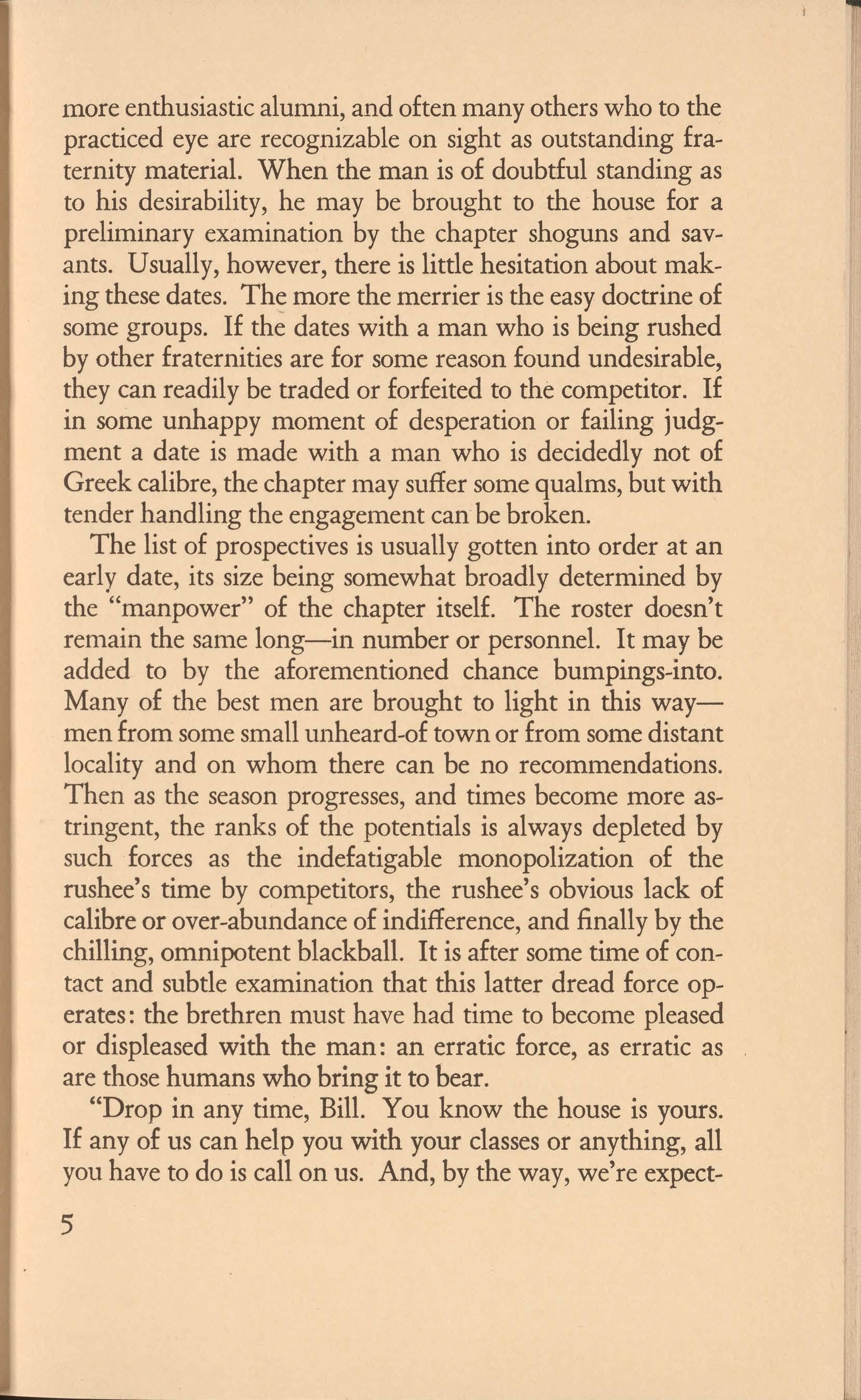
more enthusiastic alumni, and often many others who to the practiced eye are recognizable on sight as outstanding fraternity material. When the man is of doubtful standing as to his desirability, he may be brought to the house for a preliminary examination by the chapter shoguns and savants. Usually, however, there is little hesitation about making these dates. The more the merrier is the easy doctrine of some groups. If the dates with a man who is being rushed by other fraternities are for some reason found undesirable, they can readily be traded or forfeited to the competitor. If in some unhappy moment of desperation or failing judgment a date is made with a man who is decidedly not of Greek calibre, the chapter may suffer some qualms, but with tender handling the engagement can be broken.
The list of prospectives is usually gotten into order at an early date, its size being somewhat broadly determined by the "manpower" of the chapter itself. The roster doesn't remain the same long-in number or personnel. It may be added to by the aforementioned chance bumpings-into. Many of the best men are brought to light in this waymen from some small unheard-of town or from some distant locality and on whom there can be no recommendations. Then as the season progresses, and times become more astringent, the ranks of the potentials is always depleted by such forces as the indefatigable monopolization of the rushee's time by competitors, the rushee's obvious lack of calibre or over-abundance of indifference, and finally by the chilling, omnipotent blackball. It is after some time of contact and subtle examination that this latter dread force operates: the brethren must have had time to become pleased or displeased with the man: an erratic force, as erratic as are those humans who bring it to bear.
"Drop in any time, Bill. You know the house is yours. If any of us can help you with your classes or anything, all you have to do is call on us. And, by the way, we're expect5

ing you at the party Saturday night. The girls will be as disappointed as we are if you don't come. See you tomorrow." So speaks the bland upperclassman, composite Brummel and Chesterfield, as he rallies to end up a tough day with this flowering finale. He closes the Greek-lettered door on the rushee, feeling some pride in the day's work. The freshman wends his unsuspecting way to his room and to bed, duly and deeply impressed by the flattering consideration shown him by these campus big shots and duly considering the pleasures unlimited of fraternity life after the Beta Alpha (or what you will) fashion.
And while he pursues this way of rosy credulity, the sanctum of the Beta Alpha gods has assumed the normal aspect of an ordinary fraternity house. And the gods themselves, having done their collective best by the prospectives, collectively step from their Chesterfieldian pedestals and with marked relief take up the paler but more compatible role of being brothers among brethren. Coats come off, collars are unbuttoned, conversational inhibitions are dispelled. The show is over. An after-the-performance session is forthwith under weigh. Today's progress is noted, mistakes in technique are picked out, and plans and details for tomorrow and tomorrow are considered.
"I'd give a year of my life to have this mess over with. I'm so tired of pumping hands and smiling and bowing and scraping that I'm on the verge of throwing a hair-tearing tantrum."
"You're not alone. I wish they'd have a freshman mass meeting and let each fraternity go over and throw a flock of pled~e pins up in the air and let whoever gets them keep them. The results would be about the same."
"You guys, perk up. There ain't but three weeks of this. We can stand anything for three weeks."
"Darn right. Especially when we've gotta pledge a dozen good men to steer clear of the rocks."
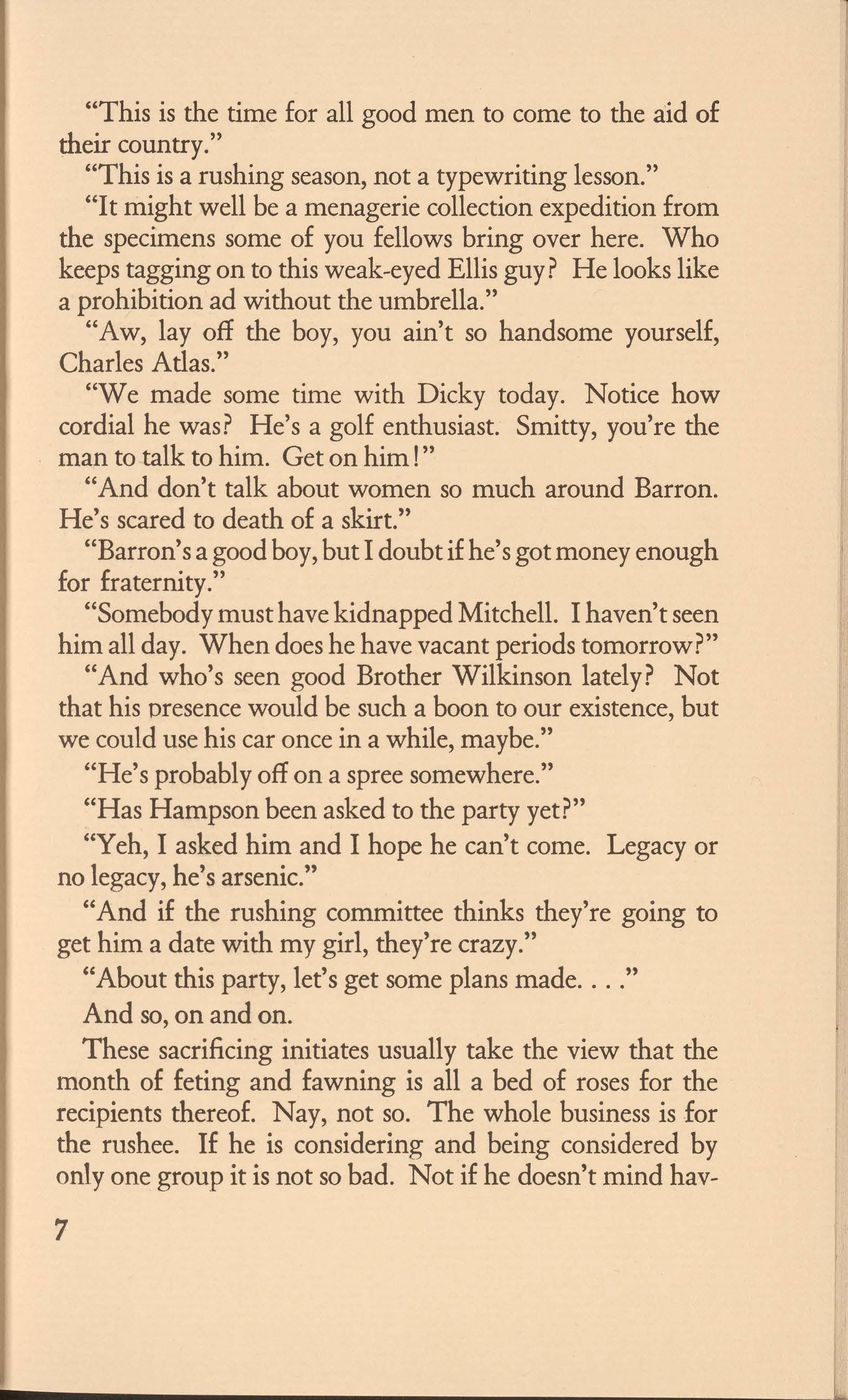
"This is the time for all good men to come to the a:id of their country."
"This is a rushing season, not a typewriting lesson."
"It might well be a menagerie collection expedition from the specimens some of you fellows bring over here. Who keeps tagging on to this weak-eyed Ellis guy? He looks like a prohibition ad without the umbrella."
"Aw, lay off the boy, you ain't so handsome yourself, Charles Atlas."
"We made some time with Dicky today. Notice how cordial he was? He's a golf enthusiast. Smitty, you're the man to talk to him. Get on him!"
"And don't talk about women so much around Barron. He's scared to death of a skirt."
"Barron's a good boy, but I doubt if he's got money enough for fraternity."
"Somebody must have kidnapped Mitchell. I haven't seen him all day. When does he have vacant periods tomorrow?"
"And who's seen good Brother Wilkinson lately? Not that his presence would be such a boon to our existence, but we could use his car once in a while, maybe."
"He's probably off on a spree somewhere."
"Has Hampson been asked to the party yet?"
"Yeh, I asked him and I hope he can't come. Legacy or 1 h ' .,, no egacy, e s arsemc.
"And if the rushing committee thinks they're going to get him a date with my girl, they're crazy."
"About this party, let's get some plans made .... "
And so, on and on.
These sacrificing initiates usually take the view that the month of feting and fawning is all a bed of roses for the recipients thereof. Nay, not so. The whole business is for the rushee. If he is considering and being considered by only one group it is not so bad. Not if he doesn't mind hav7
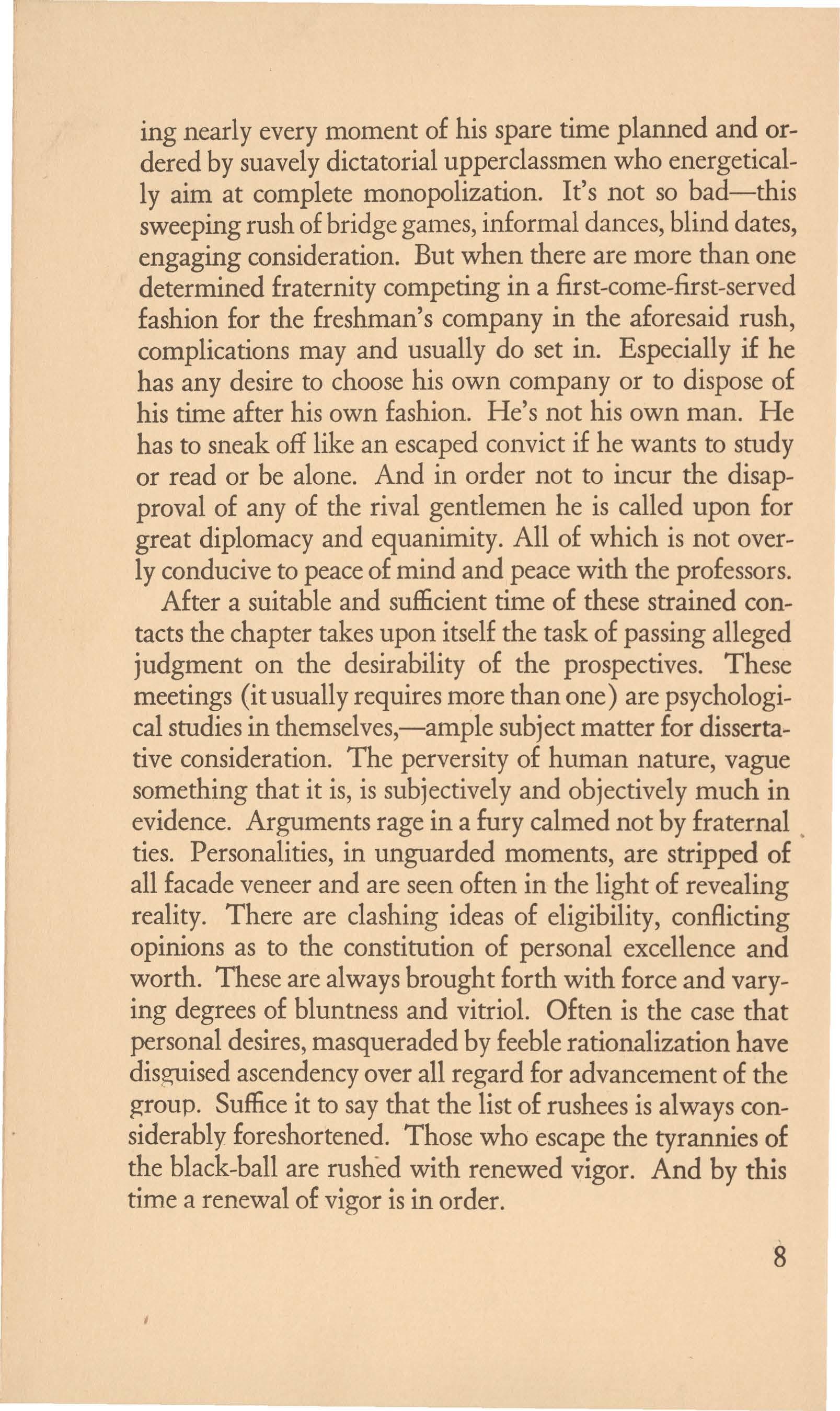
ing nearly every moment of his spare time planned and ordered by suavely dictatorial upperclassmen who energetically aim at complete monopolization. It's not so bad-this sweeping rush of bridge games, informal dances, blind dates, engaging consideration. But when there are more than one determined fraternity competing in a first-come-first-served fashion for the freshman's company in the aforesaid rush, complications may and usually do set in. Especially if he has any desire to choose his own company or to dispose of his time after his own fashion. He's not his own man. He has to sneak off like an escaped convict if he wants to study or read or be alone. And in order not to incur the disapproval of any of the rival gentlemen he is called upon for great diplomacy and equanimity. All of which is not overly conducive to peace of mind and peace with the professors. After a suitable and sufficient time of these strained contacts the chapter takes upon itself the task of passing alleged judgment on the desirability of the prospectives. These meetings (it usually requires more than one) are psychological studies in themselves,-ample subject matter for dissertative consideration. The perversity of human nature, vague something that it is, is subjectively and objectively much in evidence. Arguments rage in a fury calmed not by fraternal . ties. Personalities, in unguarded moments, are stripped of all facade veneer and are seen often in the light of revealing reality. There are clashing ideas of eligibility, conflicting opinions as to the constitution of personal excellence and worth. These are always brought forth with force and varying degrees of bluntness and vitriol. Often is the case that personal desires, masqueraded by feeble rationalization have disguised ascendency over all regard for advancement of the group. Suffice it to say that the list of rushees is always considerably foreshortened. Those who escape the tyrannies of the black-ball are rushed with renewed vigor. And by this time a renewal of vigor is in order.

The three climactic days of super-salesmanship finally come to bring the whole rushing procedure to a febrile head. The fraternity, yea fraternities, lay their carefully embellished cases before the potentials. Consideration and hospitality are almost forgotten, often for the rest of the year. Every fraternity synapse during this time is in some way concerned with the problem of getting the freshmen to see aright. Facts (the favorable ones) and figures are paraded before the freshman is an oily procession. There are degrees of sales resistance to be dealt with. With some freshmen all talk is superflous. They want to know what it costs and when it will be delivered. But there are always those who have to be sold on the whole fraternity idea and worse, those who have to be sold on the idea that one fraternity is better for them than another. In these cases there comes to the fore the chapter's ingenuity expressed in the masterful persuasive methods of the tried and trusted rush talkers. Ordinary facts in their artful hands and mouths are transformed by sly subterfuge and the ormolu of oratory into insurmountable arguments, blinding in their effulgence. The "nigger in the woodpile," inevitably pointed out by some rival group, doesn't stand a chance in the presence of these Ku Kluxers-these perfervid promulgators of persuasion. They inveigh with vitriol against the despicablepractice of "mud-slinging" and then proceed with consummate skill to expose the plain if slightly exaggerated fact that some other fraternity is a bunch of incurable inebriates. They condemn fraternal bragging and then proceed to paint in dazzling hues all the good and indifferent points of the fraternity. They advise the rushee to keep an open mind, to make his own decisions, attempting all the while to prejudice his thinking so that only one decision is possible. It's a great garne.
From all the carryings-on, this choosing of a fraternity might well be the most important step in a man's life. And 9

it is important, so long as our associations influence us as they do-and so long as mortgages have to be paid off. If he is impressed thusly with the importance of the move, it falling to some group's advantage to make the impression, the freshman is often thrown into a state of abject befuddlement. And if the upperclassman fears that the freshman will land on the wrong side of the fence he has visions of being "bumped," which reduce him to a frenzied disorganization. On the whole the thing approaches a psychological pandemonium. The doubtful man is reasoned with, preached at, cried over, embraced, often by more than one aspiring fraternity. The total result for the vacillating frosh is sufficient provocation for insanity. He may arrive at such a state that he hardly knows what he's doing or saying or eating. But when the time for choice comes, he makes up his mind on some inconsequential point and proceeds to forget, as everyone expects him to, all arguments and all fraternities except the one to which he has cast his unsophistocated lot.
Rushing season ends at midnight on the third feverish day of rush talks. The rushees are given a day of blessed silence in which to do their reflecting and deciding. During this day the initiates, being resigned to relaxation, do nothing more strenuous than hope for the best. That night the results come in with the excitement of election returns and the pledges-to-be gather with the men of their choice in some function of celebration. They are duly pledged and told how wise a choice they have made and are initiated at once into the more or less gradual process of the disillusionment.
The initiates experience a decided and often calculated let-down in fraternal fervor. They are so busy being relieved at the end of the whole business that despite resolutions to live up to the picture painted for the pledges, and desnite the urgent exhortations of the more conscientious, the disillusionment is shockingly rapid and complete. The 10
fraternity man turns his attention back into channels badly neglected during rushing season. Fraternal fanaticism cools into tepid and very ordinary interest. Girls, dances, athletics, even books, come into a natural hegemony again. Fraternity is a step-child and the neophytes are step-children to all except a dutiful office or two. Fraternity takes a second row seat till next rushing season, when the coals of enthusiasm will again be fanned into zealous flames and the brethren will rise with verve and gusto to fight the fights of old Beta Alpha. So it goes-this rushing racket.

Laugh, maiden, be gay, Clutch joy by the throat.
Choke from her infinite pain and pleasure. A darkness moves to enfold you, To hide your truths, your dreams; And, tearing loose your hold on happiness, To plunge you in a cell of Stygian darkness. So, I command, laugh.
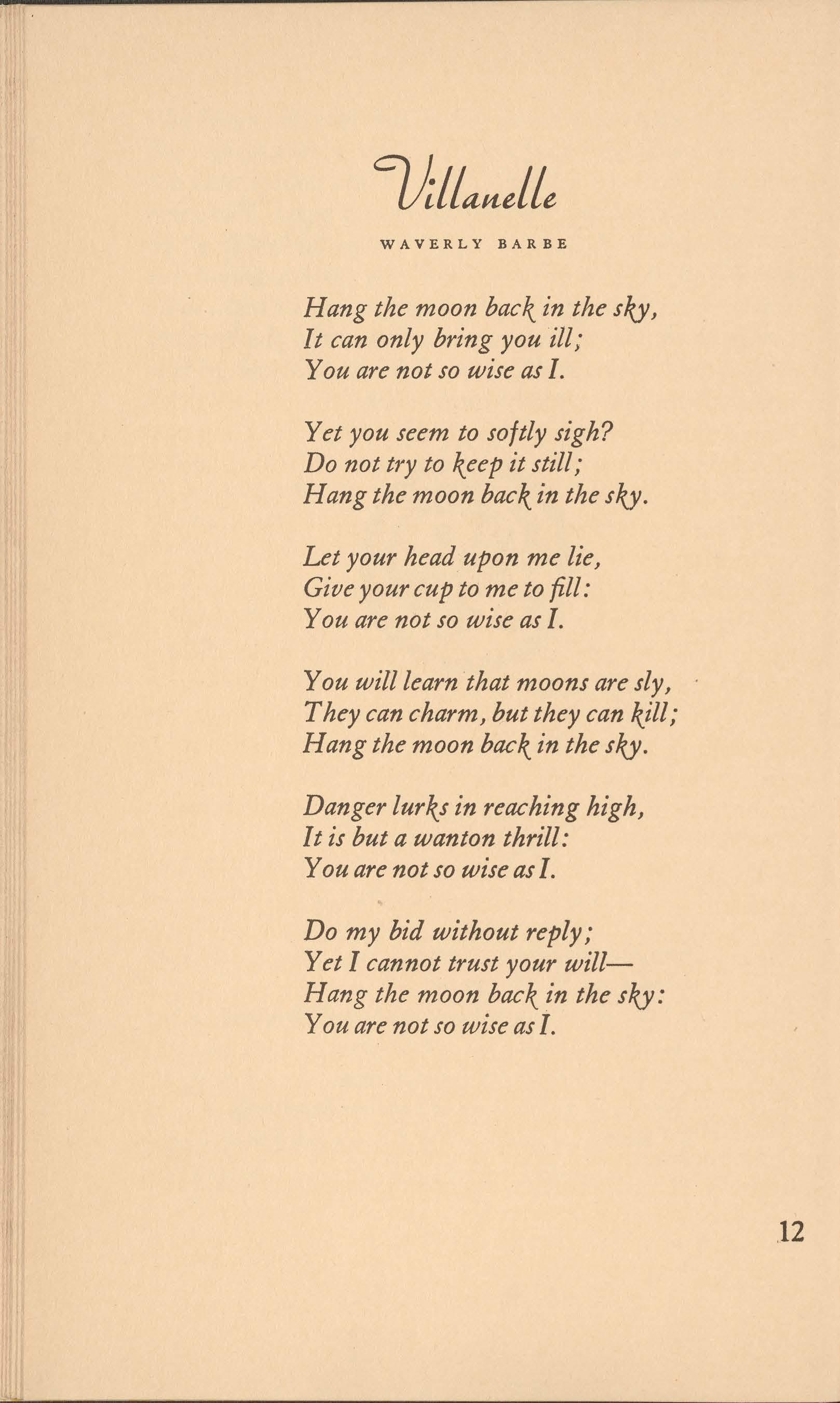
Uiffaueffe
WAVERLY BARBE
Hang the moon back in the sky, It can only bring you ill; You are not so wise as I.
Yet you seem to softly sigh? Do not try to keep it still; Hang the moon back in the sky.
Let your head upon me lie, Give your cup to me to fill: You are not so wise as I.
You will learn that moons are sly, They can charm, but they can kill; Hang the moon back in the sky.
Danger lurks in reaching high, It is but a wanton thrill: You are not so wise as I.
Do my bid without reply; Yet I cannot trust your willHang the moon back in the sky: You are not so wise as I.

or The Confessions of a Serial, Addict
BETSY CANNON
I'vE been to doctors throughout the country, specialists of every kind. No one can help me. The Foul Beast has me .firmly bound, inextricably enmeshed in its slimy tentacles. I am writing my sad story in the hope that the young people of our fair country, upon reading the sordid details of my pitiful struggle against an unscrupulous enemy, may pause amid their gay pleasures and resolve never to let the Grim Monster ensnare them.
Perhaps I had better tell my tale from the beginning. It all started, I am sure, because I was born and raised in a small town. If I had only lived in a big city! There are those, I know, who will tell you that the cities hold Pitfalls for the Young, but I know that had I not lived in a small town, the movies and night-clubs and card-playing and other innocent amusements would have kept me so busy that I should never have had enough leisure time for the insidious magazine habit to fasten itself upon me.
Yes, my friends, I am,-and I say it with my head bowed in shame-I am,-if it weren't for the thought of my aged and sorrowing mother and the many true friends who have tried to aid me in my .fight I could never say it thus in bold print for the world to see-I am a ... a ... Serial Addict.
Well do I remember the first day I ever saw a magazine. It was lying on a table in a friend's home. I recall that I started back in instinctive loathing from its lurid cover. Then timidly, attracted and yet repelled, I stretched out my hand and touched it. Assuring myself that one little peek inside could do no harm, I opened the Magazine and leafed 13
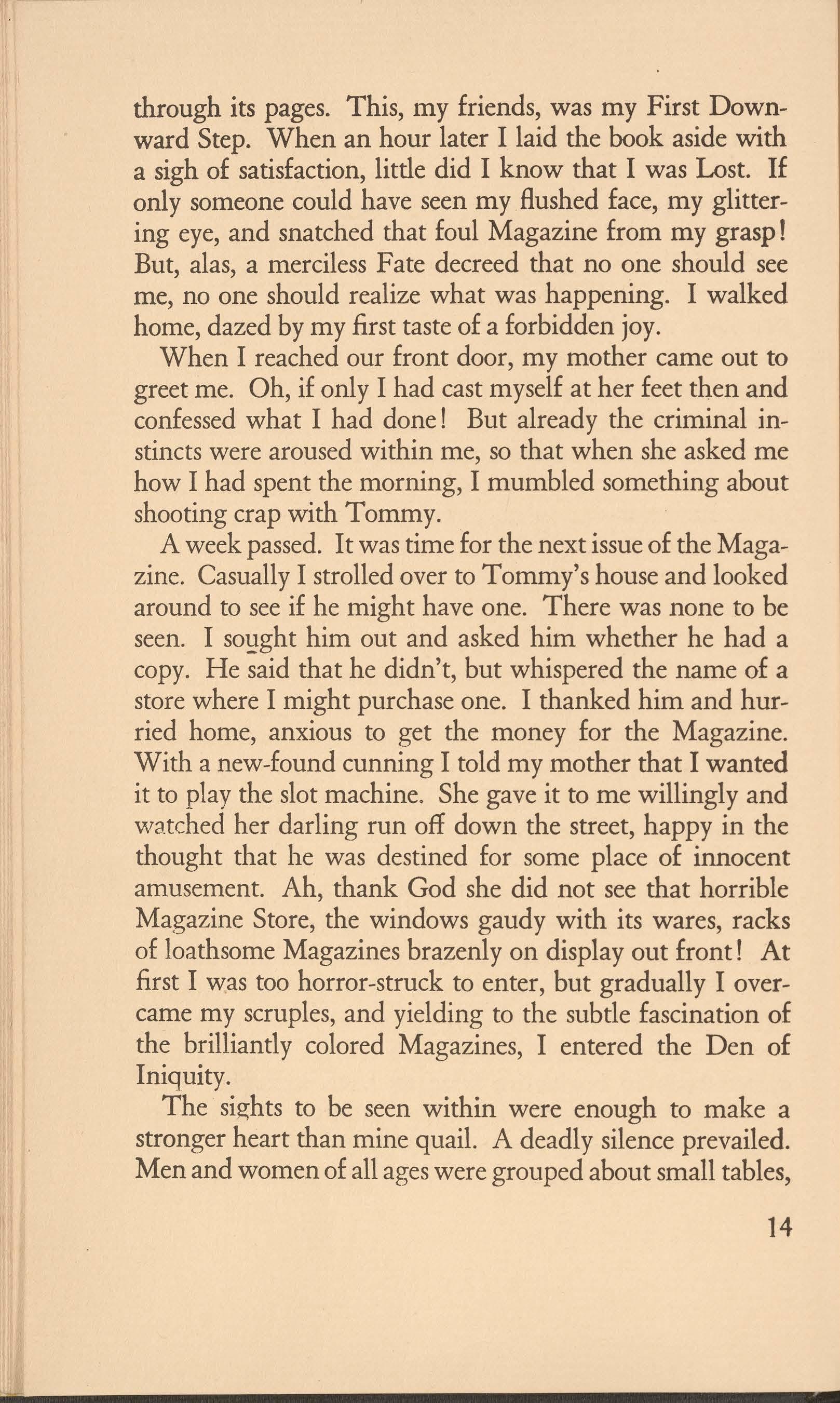
through its pages. This, my friends, was my First Downward Step. When an hour later I laid the book aside with a sigh of satisfaction, little did I know that I was Lost. If only someone could have seen my flushed face, my glittering eye, and snatched that foul Magazine from my grasp! But, alas, a merciless Fate decreed that no one should see me, no one should realize what was happening. I walked home, dazed by my first taste of a forbidden joy. When I reached our front door, my mother came out to greet me. Oh, if only I had cast myself at her feet then and confessed what I had done! But already the criminal instincts were aroused within me, so that when she asked me how I had spent the morning, I mumbled something about shooting crap with Tommy.
A week passed. It was time for the next issue of the Magazine. Casually I strolled over to Tommy's house and looked around to see if he might have one. There was none to be seen. I so~ght him out and asked him whether he had a copy. He said that he didn't, but whispered the name of a store where I might purchase one. I thanked him and hurried home, anxious to get the money for the Magazine. With a new-found cunning I told my mother that I wanted it to play the slot machine. She gave it to me willingly and watched her darling run off down the street, happy in the thought that he was destined for some place of innocent amusement. Ah, thank God she did not see that horrible Magazine Store, the windows gaudy with its wares, racks of loathsome Magazines brazenly on display out front! At first I was too horror-struck to enter, but gradually I overcame my scruples, and yielding to the subtle fascination of the brilliantly colored Magazines, I entered the Den of Iniquity.
The sights to be seen within were enough to make a stronger heart than mine quail. A deadly silence prevailed. Men and women of all ages were grouped about small tables, 14
all reading, reading, intently. They were the ones who were "taking theirs on the premises." Back in a far corner, where the cigarette smoke was thickest, were a few hard-faced men feverishly engrossed in their Magazines. These, the man behind the counter replied to my cautious inquiry, were the old hardened serial addicts. "Watllya have?" he snarled, leaning over the counter toward me.
I managed to stammer out the name of the Magazine I wanted, and he handed it to me, scraping up the money I gave him without a second's thought for my tender years. I sneaked out of the shop, with my cap pulled far down over my eyes and my coat collar well turned up, hoping that none of my friends would see me. I hurried home, tip-toed up the steps, and locked myself in my room, trembling with eagerness. Not even pausing to take off my coat, I flung myself down on the bed and with feverish hands tore open the Magazine. Anxiously I thumbed the pages. Ah, there it was-the Serial ! "So, Reginald Montrose, you think to h I ,, t wart me ....
I devoured it to the " .... and as the next shot rang out Lady Gwendolyn raised the bottle to her lips and drained the poison"-Continued Next Week. Little did I realize that the trap was sprung, that I was but another victim of the Serial.
As the years went by, I fell deeper and deeper into the clutches of the vice until I was no longer my own master. Often as I sat at my desk, trying to work, I would catch myself listening for the sound of the postman's knock, in the hope that it would signal the arrival of a new Magazine with another installment of the current Serial.
Not only did my work suffer, but 1 was squandering all my money on the Magazines, often finding myself without enough for the bare necessities of life-the night-clubs, poker-playing, and horse-racing which I must have.
15


Things went from bad to worse. All but the staunchest of my friends left me, pitying my contemptible weakness, but realizing that they were powerless to help. Three years ago my poor old white-haired mother took a job as a speakeasy hostess in order to earn enough to keep me on my endless round of the doctors' offices,searching for the relief they cannot give me. When Repeal came and the speak-easies closed,..Mother sought work for months without success. Now she is slaving as a radio stooge.
Too late, too late, I see the error of my ways! I am doomed. I know it now. For a time I tried to break myself of the Serial habit by reading short stories. All in vain ! My system craved Serials, and Serials it must have, although I have succeeded in cutting down my allowance to three a week. The next step in my Downward Path is detective stories. After that-who can tell?
You who read this, pause and reflect. Have you, perchance, a little brother or sister? Then here and now I beg of you to make a solemn vow never to expose him to the perils of the vile Magazine, lest he become a Serial Addict like me.
No one but You can save our nation from this curse. The Publishers won't help you. They have alluring covers put on their Magazines to catch the eye, and with fiendish guile arrange their Serials so that a new one starts the same week an old one is concluded. Ah, how often the poor victim finishes the last installment of a Serial with a sight of relief, but e'er the feverish glitter has died from his eye, his attention is caught by a new story beginning in the same issue, and, uttering a low moan, he begins to read and is soon lost to the world !
Even the doctors, far from helping the addict, throw further temptation in his path by loading their waiting room tables with the very Magazines he is trying tn avoid! .
My friends, I appeal to you. For me there is no remedy; I cannot be saved. But there are millions of children in our land, the Fair Flower of Tomorrow, who can and MUST be kept from this Fate that is Worse than Death. Therefore, I say, do your part toward protecting them. Let your motto be: "No Serial in Our Home."
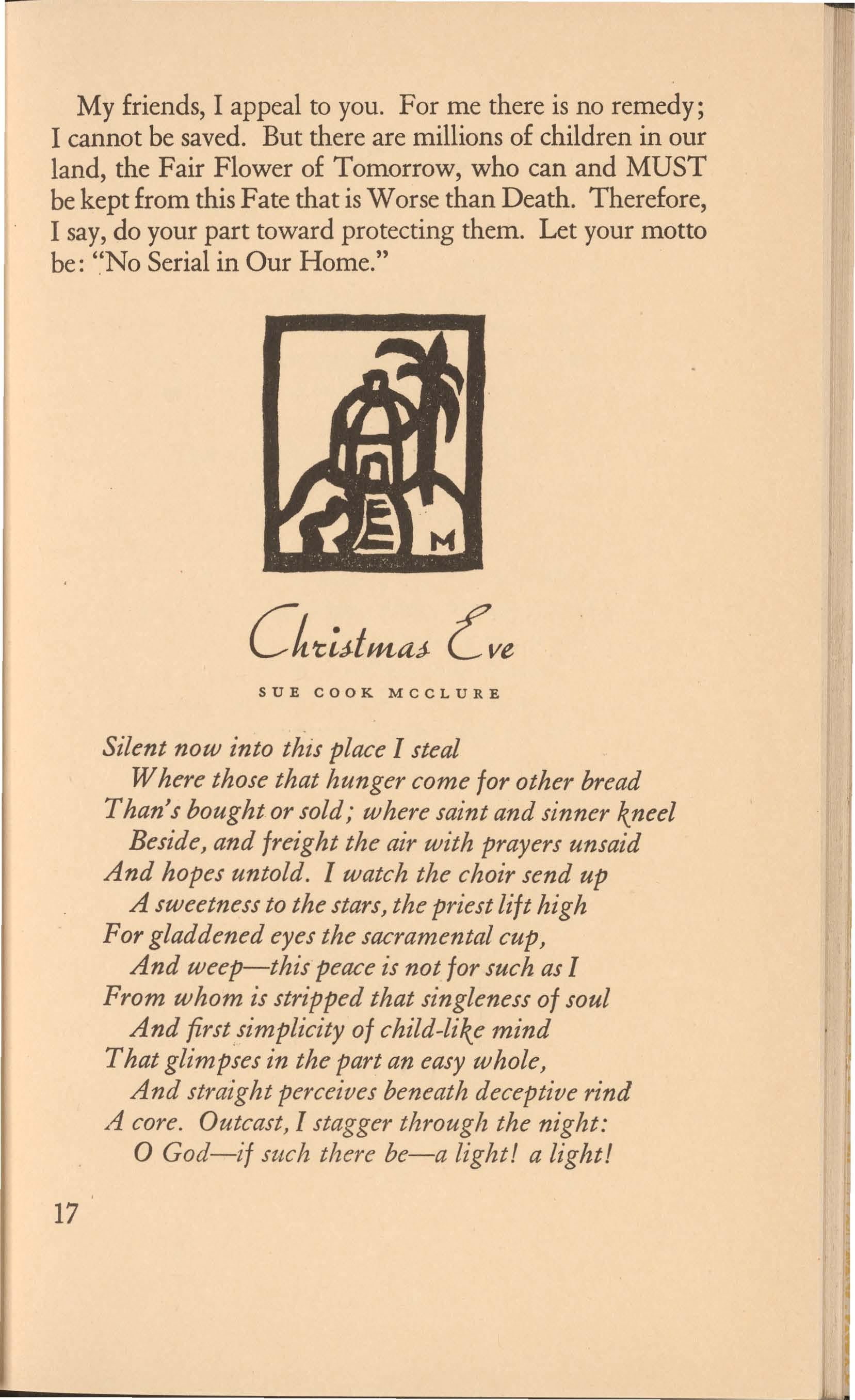
SUE COOK MCCLURE
Silent now into this place I steal
Where those that hunger come for other bread
Than's bought or sold; where saint and sinner kneel Beside, and freight the air with prayers unsaid And hopes untold. I watch the choir send up
A sweetness to the stars, the priest lift high
For gladdened eyes the sacramental cup, And weep-this peace is not for such as I From whom is stripped that singleness of soul And first simplicity of child-like mind
That glimpses in the part an easy whole, And straight perceives beneath deceptive rind
A core. Outcast, I stagger through the night: 0 God-if such there be-a light! a light!
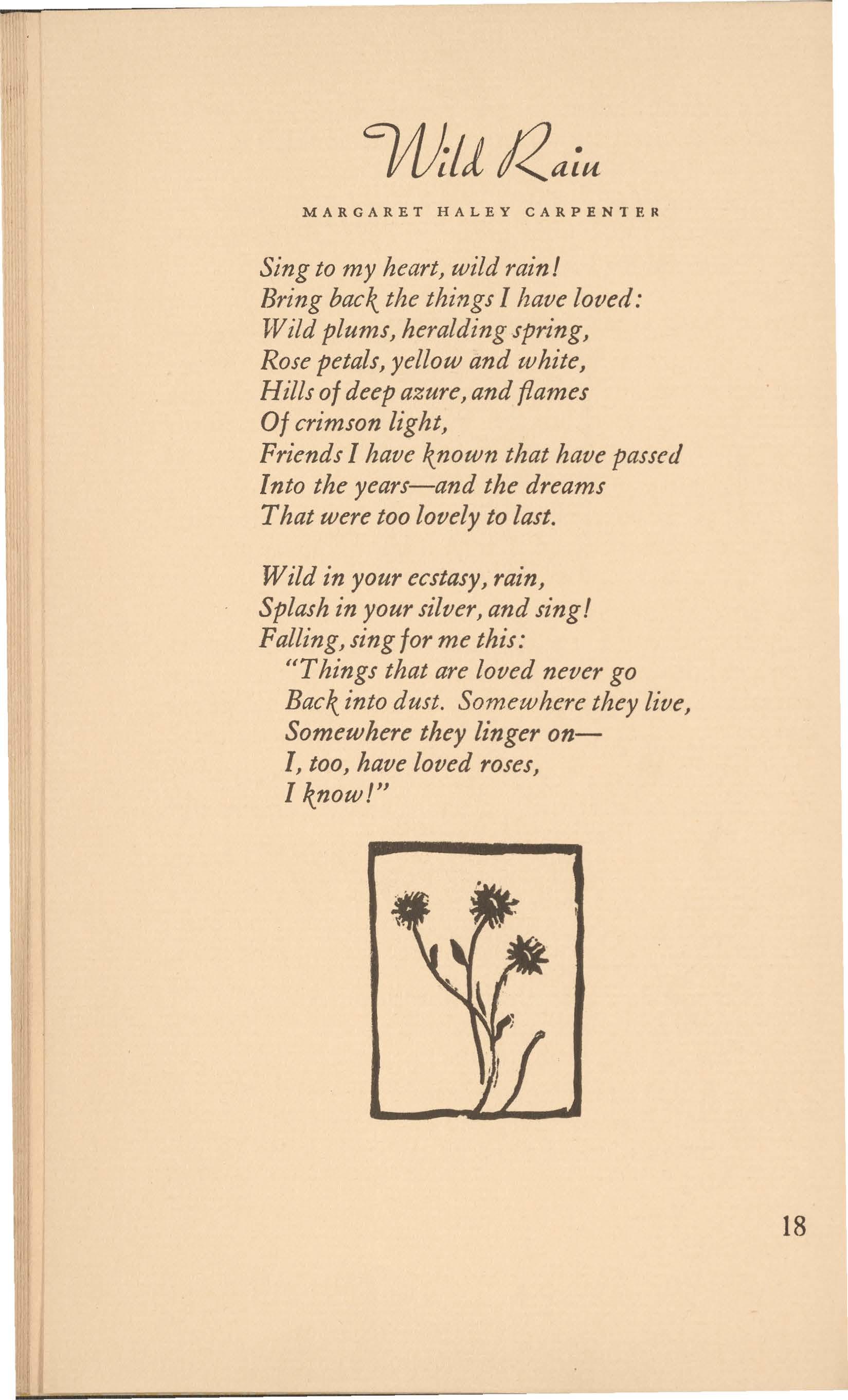
MARGARET HALEY CARPENTER
Sing to my heart, wild rain! Bring back the things I have loved: fVild plums, heralding spring, Rose petals, yellow and white, Hills of deep azure, and fiames Of crimson light, Friends I have known that have passed Into the years-and the dreams That were too lovely to last.
Wild in your ecstasy, rain, Splash in your silver, and sing! Falling, sing for me this: "Things that are loved never go Back into dust. Somewhere they live, Somewhere they linger on1, too, have loved roses, I know!"

FLORENCE RHEA TALLEY
WHEN theorists and politicians will have at last brought us to the Ideal State, human nature will still remain distressingly obstinate, and we shall continue to listen for the sane voiceof George Meredith. For there is nothing in this world that age or custom can take away. He lived in a time of struggle and materialism; yet he bequeathed to posterity nothing of the atmosphere of his time. He does not plead for better schools or higher wages; all that great whirl of institutions and custom which Dickens pictures is out of his range. Instead he focuses his gaze on that part of the human mind just below the surface of articulate consciousness, and draws with fine detail what he sees there. The record of Sir Willoughby Patterne's egoism will endure as a mirror for future egoists, and Evan Harrington will continue to scale the social heights. There is nothing that will grow dusty or obsolete. Everything is as intense and vital as life itself, as .complex and as crowded. It is remarkable how Meredith, who could create the utmost art, failed utterly in the most simple problems of the novelist. What he did was done supremely well or not at all. His need for a plot led him into the most extravagant mazes, where the story wandered among confused paths, waiting patiently by while a philosophic dissertation takes its place, and finally stumbling out of doors with a few crumbs in the last chapter. Meredith ' did not achieve perfection of form until he wrote The Egoist, and defying tradition, proclaimed that the story which existed in the mind was the only story one needed. Nor does his style always retain its
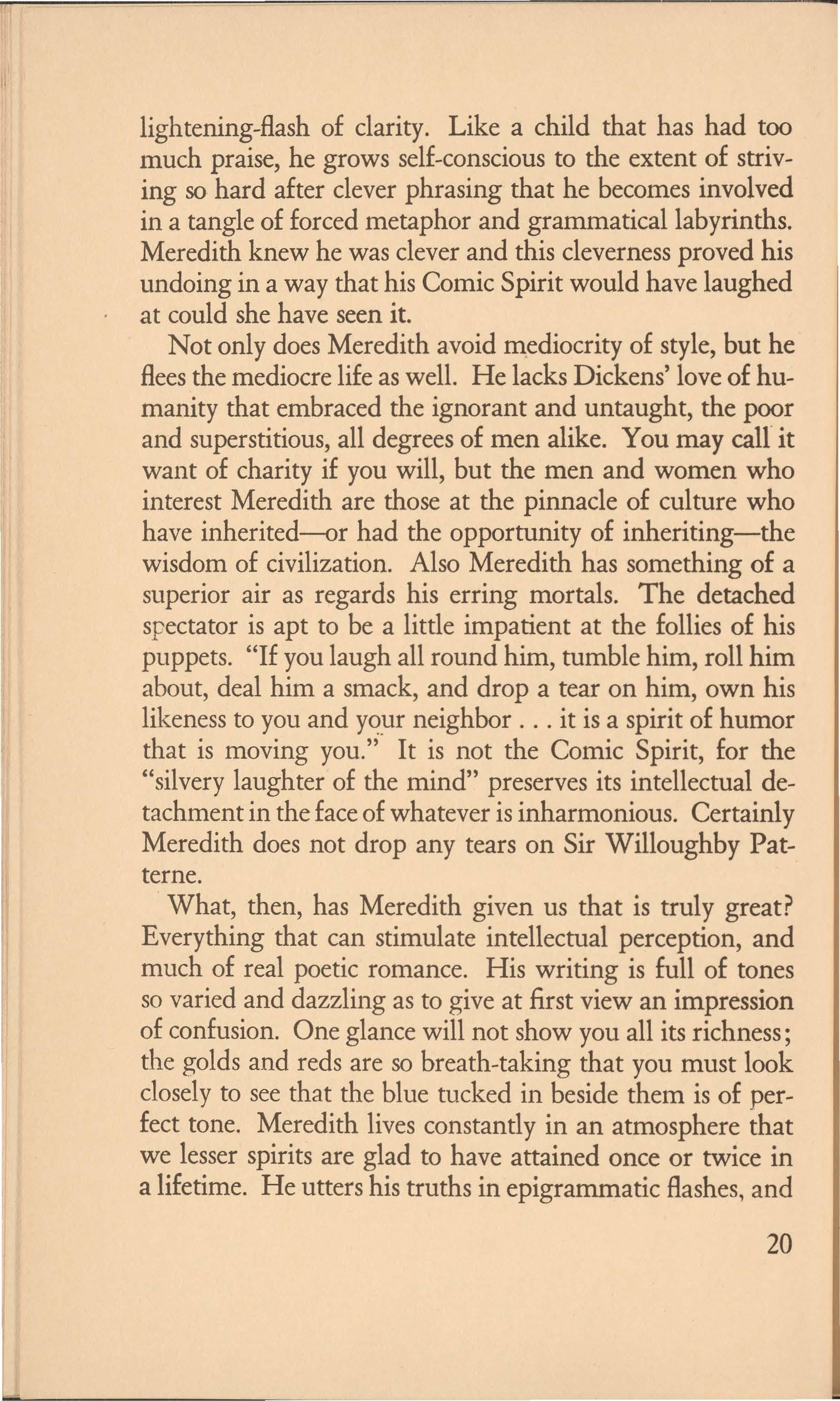
lightening-flash of clarity. Like a child that has had too much praise, he grows self-consciousto the extent of striving so hard after clever phrasing that he becomes involved in a tangle of forced metaphor and grammatical labyrinths. Meredith knew he was clever and this cleverness proved his undoing in a way that his Comic Spirit would have laughed at could she have seen it.
Not only does Meredith avoid mediocrity of style, but he fleesthe mediocre life as well. He lacks Dickens' love of humanity that embraced the ignorant and untaught, the poor and superstitious, all degrees of men alike. You may call it want of charity if you will, but the men and women who interest Meredith are those at the pinnacle of culture who have inherited-or had the opportunity of inheriting-the wisdom of civilization. Also Meredith has something of a superior air as regards his erring mortals. The detached spectator is apt to be a little impatient at the follies of his puppets. "If you laugh all round him, tumble him, roll him about, deal him a smack, and drop a tear on him, own his likeness to you and yo_urneighbor ... it is a spirit of humor that is moving you." It is not the Comic Spirit, for the "silvery laughter of the mind" preserves its intellectual detachment in the face of whatever is inharmonious. Certainly Meredith does not drop any tears on Sir Willoughby Patterne.
What, then, has Meredith given us that is truly great? Everything that can stimulate intellectual perception, and much of real poetic romance. His writing is full of tones so varied and dazzling as to give at first view an impression of confusion. One glance will not show you all its richness; the golds and reds are so breath-taking that you must look closely to see that the blue tucked in beside them is of perfect tone. Meredith lives constantly in an atmosphere that we lesser spirits are glad to have attained once or twice in a lifetime. He utters his truths in epigrammatic flashes, and 20

our imagination at once perceives their reality. When sentimentalists are inclined to condemn Meredith as too intellectual, they have only to read of Laetitia Dale, "who carried a romantic tale on her eyelashes," or-
"The gulf of a caress hove in view like an enormous monster hollowing under the curled ridge.
"She stooped to a buttercup; the monster swept by." Here is a fusion of imagination with intellect that can find an equal only in poetry.
The reigning spirit of Meredith's work is the Comic Muse. It is she who is the arbiter of harmony and proportion in the world; when she seesa character grown crooked or lopsided, or a wholesome sentiment that has put out too much sentimentality, it is her duty to restore the natural balance. We hear her laughter and see that we are egoistic or overambitious, and hasten to change ourselves to gain her approval. The glass of Meredith's awareness shows with merciless clarity every absurd twist in a man's soul, made more outrageous by comparison with the sanely intellectual atmosphere in which it vibrates. Yet this glass of his is no mere revealer of actuality; rather it is a crystal so fine that whatever is seen through it takes on a thousand dancing sparks of light and color, the smile of the Comic Muse. It is this ability of Meredith to infuse his observation with irony and even poetry that keeps him from seeming too pitiless. For he is less than Dickens to the victims of his laughter. He does not unmask them directly by the speech or action that reveals their weakness. Meredith's art is more subtle than that. Instead he starts them off with a very good opinion of themselves; then by a stroke of analysis or .t deft observation he tears off, one by one, the poor shreds of pride and delusion with which they have covered themselves and leaves them standing there, gazing upon the deficiencies of their naked souls. This is not humor; it is the comedy of AristoDhanes and Moliere.

Having a sane view of things, Meredith had also a philosophy, and strangely enough this philosophy in part reminds one of that of a great Romantic poet. Meredith loved nature as dearly as Wordsworth, and could turn from a psychological analysis to a glowing description of a wild cherry tree in bloom. It is this closeness to nature that gives his novels much of their vigor and vitality. While of the trinity -blood, brain, spirit-he exalts mainly the spirit, yet Meredith harkens also to the demands of the blood. For him the natural law is so closely bound with human law that no morsel of experience must be lost. Life has given us many sensations that must be known. Every man has within him a part of the earth-spirit, and to identify himself with the interests of earth is to attain completeness. If Meredith becomes ecstatic over the scenic beauties of nature, he is positively delirious face to face with one of nature's highest creations, woman. In his women we have not only intellectual, but romantic comedy as well. They are all Rosalinds in wit and charm, with a few other graces added. Woman, Meredith would say, is closer to nature than man, -perceiving more deeply the laws of proportion that governs us . When a man enters into relations with a woman, then his attitude will tell whether or not he needs the chastising of the Comic Spirit. It is this subtle adjustment between the sexes that makes up Meredith's most interesting theme. In a society where women are inferior, he says, there can be no Comic Spirit; that is almost the same as saying there can be no true civilization. The egoists and fools of his comedies desire woman as a "virgin white page across which they can scrawl their names." Sir Willoughby Patterne sought in Clara a blushing complement to his own manly dignity; if he had loved her truly, she might have pruned him of his smug delusions. Look at the genuinely mated couples of Meredith. Here it is the appreciative man, the Redworth of Whitford, who is rewarded with a Diana. Man and woman 22

meet on the same level, their companionship undisturbed by the predominance of either sex.
Having created his women as tests of his men's sanity, Meredith proceeded to fall head-over-heels in love with them. He cannot think of Clara Middleton, of Diana, or Rene, without observing how "aspens imaged in water, would offer a susceptible lover some suggestion of her face." He has given them intellect; now he gives them glamor, and the combination arouses him to poetic ecstasy. Even Mrs. Mounstuart Jenkinson is superior to the smug egoist.
As for the men, it is they who have to face the Comic Muse. They are all suffering from some misreading of life. There they are before us, every line clearly drawn. There beside them are the women and the men of sane judgment, and what a humiliating contrast! Meredith is one of the best teachers we have had. Wherever men are cultured and thoughtful, they will seek their own natures in his sparkling glass. And they will not fail to hear, in that ear of the mind to which Meredith played, the silvery laughter of the Comic Muse.
Bibliography
KNIGHT,GRANTC., The Novel in English, N. Y., Richard C. Smith, 1931.
A HISTORYOFENGLISHLITERAT~RE,Legouis and Cazamian, N. Y., Macmillan, 1929.
PRrnsTLEY,J.B.,George Meredith, N. Y., Macmillan, 1926. ·
SENCOURT,RoBERTEsMONDE,The Life of George Meredith, N. Y., Scribner's, 1925.
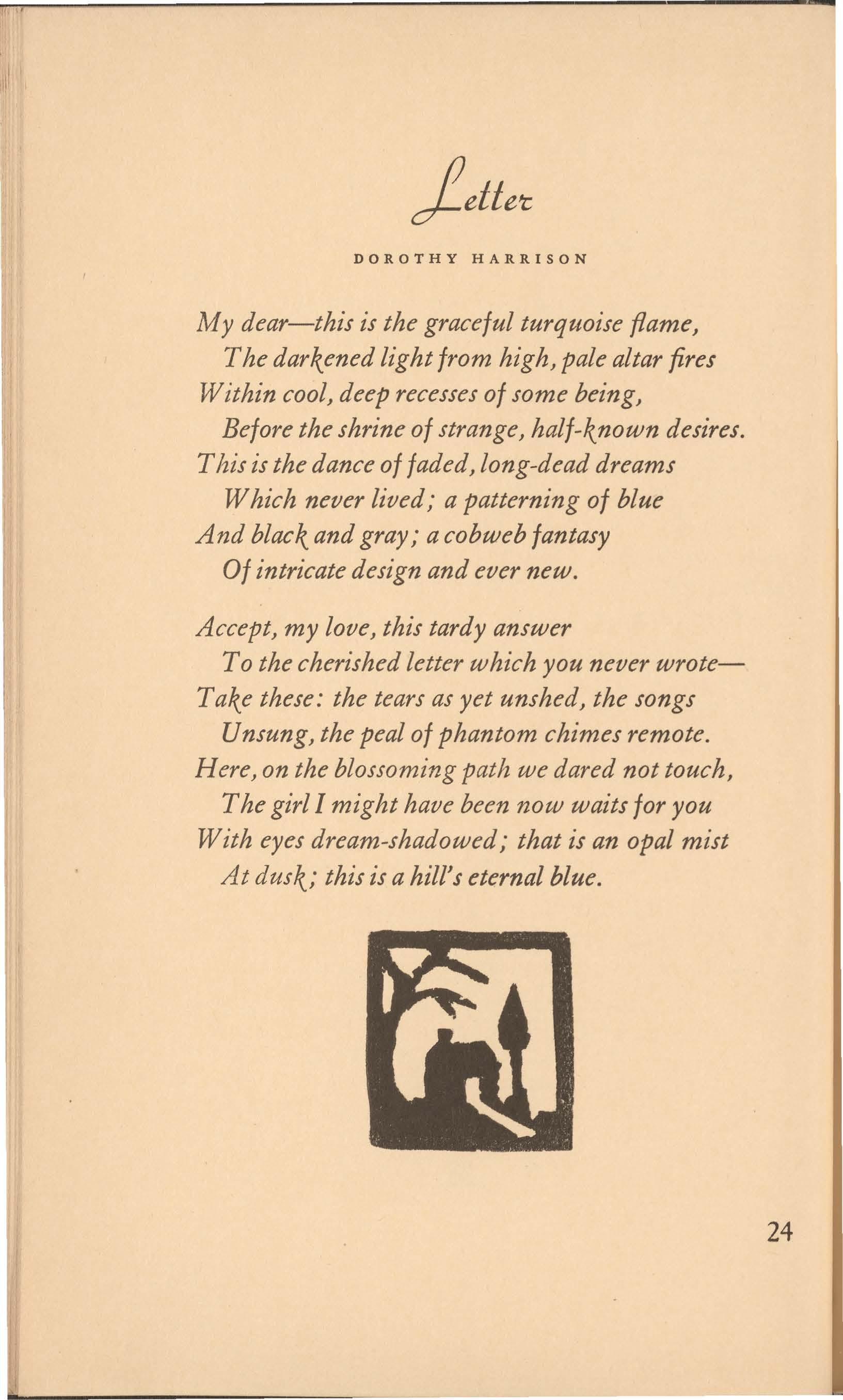
My dear-this is the graceful turquoise fiame, The darkened light from high, pale altar fires Within cool, deep recesses of some being, Before the shrine of strange, half-known desires. This is the dance off aded, long-dead dreams Which never lived; a patterning of blue And black and gray; a cobweb fantasy Of intricate design and ever new.
Accept, my love, this tardy answer To the cherished letter which you never wroteTake these: the tears as yet unshed, the songs Unsung, the peal of phantom chimes remote. Here, on the blossoming path we dared not touch, The girl I might have been now waits for you With eyes dream-shadowed; that is an opal mist At dusk; this is a hill's eternal blue.
